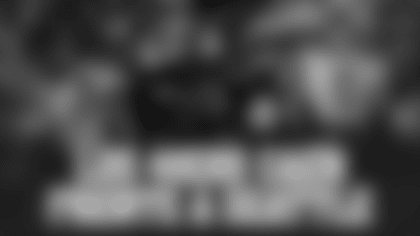**

Opening statements:**
"Good morning. Just a couple of the injuries: [LB Parys] Haralson, thumb contusion; [DT Kentwan] Balmer, shoulder sprain; [WR Josh] Morgan, hip contusion; [WR Arnaz] Battle, leg strain; [RB Michael] Robinson, stinger; [WR Isaac] Bruce, ankle. We're getting excited about this week. We've got to have another great week of preparation to get ready to go up to Seattle and try and win a football game against a very good football team."
On whether FB Brit Miller's call-up is an indication that Robinson and Battle are iffy to play:
"No, I just think with [S] Curtis [Taylor] having his injury and going down, we just thought it would be a good move to bring him up. Brit has been working his tail off. We have an award for the special teams player of the week, whether it's offense, defense or special teams. And, he's the guy who has won them all. You could name him every week. So, I just think he's a guy who could really help us on special teams going forward."
On whether the noise of Qwest Field will impact the difficult of calling the snap in the shotgun:
"No, I don't think so. But, you can still run the spread and get him under center, however it works out. But, as far as the noise is concerned, that's just something that we have to continue to work on. Everybody that goes in there has to do the same thing. Thankfully, this isn't the first game that we've been in a situation like that. We just have to do a good job of managing it this week."
On how he can improve his team's tackling:
"It's just something that's an ongoing thing. We just have to get enough guys to the ball. Guys on the back end have to understand that we have to tackle. We just have to tackle. It's not that you've got a guy – I think I said before – like [S Dashon] Goldson. It's not a matter of him not wanting to tackle. It's a good problem. He wants to come up and knock everybody out, but he has to come up and settle down and tackle a guy. Going forward, it's just something that throughout the rest of the year, we just have to continue to focus on."
On whether the team still practices with pads:
"No."
On when that ended:
"A couple of weeks ago."
On whether that was because at this point in the season it's unnecessary:
"Negotiating with a couple of players. That's all that was."
On whether not practicing with pads has anything to do with the tackling issues:
"No. No, not at all."
On whether the players approached him or he approached the players:
"Both. I think one of the most important things in anything you do is relationships and communicating. I'm constantly looking for any type of hindrances or anything that can keep us from getting where we need to go, anything that might come up trying to head them off. I'm all about being proactive. I don't want to ever hear, 'Well, coach, at that particular time, this was happening. You just didn't know it.' I don't want to hear that. I want to make sure that I'm asking, and, at the same time, I'm inviting them to talk to me, not that I'm going to agree with everything, not that I'm going to concede to everything. It's just a matter of, if that makes sense, then let's look at it. If not, then we won't do it."
On how he hears from players' grumbling and how he adjusts to make sure that everyone's voice is heard:
"I think, first of all, I'm always around the players. I'm always talking to the players. I think, when you have captains on the team, when you have leaders on the team, I talk to everybody, whether they're practice squad guys or not. Like I said, it really is all about seeing. Just opening your eyes and opening your ears and trying to see things and really reading body language. That's a huge thing. I just try to be proactive that way."
On whether cutting back on the padded practices was a discussion about wear and tear on the players' bodies:
"Yes. I think when guys come out here and they have the pads on, it's more of a psychological thing than anything else. The pads, how much do they weigh? They weigh a couple of pounds, but the fact that you have them on brings on the fact that you might hit. So, if the guy has sore shoulders, it's just a matter of when you don't have those things, you have the shells on, you just feel a lot better mentally. So, it's more psychological than anything else."
On whether any of the running backs have approached him about their concern of having lesser role in a spread offense:
"Absolutely. I think any great player, any great player that I've been around, whether it's Walter Payton, whether it's a great receiver, Jerry Rice – whoever it might be. When they're not getting the ball, they feel like they're not contributing. They feel like they're not a part of it. I've talked to all of our guys and had them understand that we need to understand that, going forward, everybody will have their part in the success. Everybody will have their part. It's really important that we're for one another. It's really important that we might as well, if we really want to win, If we really want to do this right, we need to be happy about the other guy. When somebody else has the ball, instead of me being upset about me not having the ball, go find a block and help free him up. So, whatever the situation, it's just important that at this particular time of year, not everybody is going to be happy. Once again, we talk about a family. I don't know one family anywhere in America or in the world for that matter where everybody is happy. I just think that it's all about being a team player. It's all about doing your best when you have the opportunity. But, I think everybody needs to know that the common denominator must be to win. It must be that. If it's not that, than we're thinking the wrong thing. We're going in the wrong direction. I think everybody understands that, but it doesn't take away the fact that I don't feel totally great if I don't feel like I'm making a contribution."
On whether RB Frank Gore has expressed with concerned:
"I've met with all of our guys. I've met with all of our offensive guys, just had some open dialogue about it going forward. Everybody is on the same page, including Frank, and I understand full-well when that happens. It's like when I was playing. If I didn't get 10 tackles, I'm sitting there and I'm thinking, 'Daggumit. Man.' Somebody else got two or three picks, another linebacker, thinking, 'I'm glad we won, but I've got to do a better job. How do I get another pick?' He's excited about it. I want to be excited about it. I can be excited about it for him, but at some point in time, I'm going to think about, 'Wow, I need to do a better job to contribute more.' So, to me, that's what that is."
On whether Gore is more concerned with winning or his statistics:
"Frank is a team guy. But, it's like anything else. I don't know if you've ever been in a situation where it may be a family member, it may be a team member and somebody else does something great. You want to be happy for them, but it's a natural thing. You can't take away from the fact that you want to do well too. You want to make sure that you're doing everything that you can to make sure that you're a part of that. I don't think it's any more than that, but to ask someone not to be natural, to ask someone not to be human, I just think it's just a matter of everybody understanding where we're striving to go. It has to be family. It has to be team, knowing that not everybody is going to happy all of the time."
On whether the competition from wanting to do more is helping or hindering the offense:
"No, I think there's nothing like competition. You want a situation where guys are saying, 'Man, I've got to do more. I want the ball.' If I've got receivers that don't want the ball, then something is wrong. If I've got a running back who doesn't want the ball, then something's wrong. But, I think there's a limit to it. There's a point to being competitive and wanting to contribute and being selfish. There's a thin line there somewhere, and everybody has to find that for themselves. But, I just think it's important that we all understand that in order for us to get where we need to go, everybody has to be on board. I do know that, and I think they understand that. Frank is not going to lose his mind if he doesn't get 100 yards because I think, at the end of the day, it's all about winning. He may be upset at the moment, but I know he's going to come back the next day and say, 'Hey, you know what? I'm glad we won. I know I did contribute.' The thing I want them to understand is, if you're a running back and you've got wide outs that are making plays, that makes it easier. That makes your job easier. If you're a wide out or you're a quarterback, that makes your job easier. Everybody needs to understand that I don't care about that game. If you didn't shine that game, you're number is going to be called, but just understand that everybody makes everybody else's job better. So, to me, that's really the bottom line that they understand that."
On whether Hasselbeck looks different on film since the last they faced him:
"No, he is still throwing the ball on the money. He is still doing a good job throwing the ball. The timing has been great. Hasselbeck is Hasselbeck. He sits back there and if he has time, he is going to get the ball out and he is going to hurt you. I don't see anything different."
On whether the offense will change week-to-week based on the opponent:
"Obviously, I would like to see more carry-over. But, where we are right now, I think the most important thing is you want to go into every game just like every other offense. You are going to go into the game thinking that you want to be balanced. You have a game plan, but if you are running the ball better, then maybe you are going to run 60-40; if you are throwing the ball better, maybe you are going to throw 60-40. I think you have a tendency, coordinators, they can't help it. You don't want to outsmart yourself. If your team is doing something well against that particular defense, then you want to try to do it."





